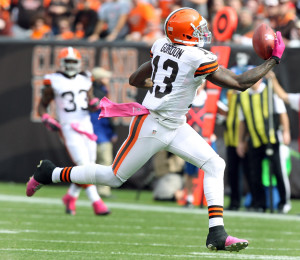by Chase Stuart
on June 4, 2014

Gordon smoked the defensive back on this play.
led the league with 1,646 receiving yards last year. That’s impressive: perhaps even more impressive is that he did it on “only” 159 targets, meaning he averaged 10.35 yards per target. But the most impressive part, of course, was that he did it for the Browns. You know,
the Browns, quarterbacked by a three-headed monster of
Jason Campbell,
Brandon Weeden, and
Brian Hoyer, each of whom managed to average a around the same mediocre 6.4 yards per attempt.
Here’s another way to think of it. While Jordan Cameron was somewhat efficient (7.7 yards per target), the other three Browns to finish in the top five in Cleveland targets were Greg Little (4.7 yards per target), Chris Ogbonnaya (4.6), and Davone Bess (4.2!). And here’s yet another way to think of it: the Browns threw 681 passes last year and gained 4,372 passing yards. But 1,646 of those yards came on the 159 passes intended for Gordon. Remove those plays, and Cleveland averaged just 5.22 yards per pass attempt on passes to all other Browns last year.
That means Cleveland averaged 5.13 more yards per target on passes to Gordon in 2013 than on passes to everyone else. That’s insane, particularly over 159 targets. How insane? If we multiply those two numbers, we get a “value relative to teammates” metric: Gordon gained 816 more yards on his targets than the other Browns averaged per target. Now, in the abstract, maybe 816 doesn’t mean much to you. But it’s the most of any player since at least 1999. The table below shows the top 75 wide receivers in value relative to teammates: the columns should be self-explanatory, and the “ROT Y/A” shows the yards per attempt on passes to the rest of the team. As always, it’s fully sortable and searchable; by default, it displays only the top 25 receivers, but you can switch that by clicking on the dropdown box to the left. [continue reading…]
Tagged as:
Josh Gordon,
Targets,
WR Project,
WR Ranking Systems
{ }
by Chase Stuart
on March 21, 2014

Shorts makes a meaningful catch.
Which player led the league in meaningless receiving yards last year? Wait, what
are meaningless receiving yards?
I am defining a meaningless receiving yard as one where:
- On third or fourth down, a player gained fewer yards than necessary for the first down.
- The receiving yard(s) came in a loss and when the player’s team trailed by at least 28 points.
- The receiving yard(s) came in a loss and when the player’s team trailed by at least 21 points with fewer than 15 minutes remaining.
- The receiving yard(s) came in a loss and when the player’s team trailed by at least 14 points with fewer than 8 minutes remaining.
- The receiving yard(s) came in a loss and when the player’s team trailed by at least 9 points with fewer than 3 minutes remaining.
This definition is not perfect — Le’Veon Bell had a 29-yard reception on 3rd-and-30 last season against the Patriots, and then rushed for a first down on 4th-and-1 — but I think it gets us close enough to perfect that I feel comfortable using it. The results aren’t too surprising — two Jaguars ranked in the top three, separated by the player who led the league in receiving yards — but that doesn’t have to be the end of the analysis. [continue reading…]
Tagged as:
Cecil Shorts,
Josh Gordon
{ }
by Chase Stuart
on March 11, 2014
During the 2013 offseason, I wrote 32 articles under the RPO 2013 tag. In my Predictions in Review series, I review those preview articles with the benefit of hindsight. Previously, I reviewed the AFC West, the NFC West, the the AFC South, and the NFC South. Today, the AFC North.
Marvin Lewis, Jim Mora, and the Playoffs, May 30, 2013
In this article, I noted that Marvin Lewis had coached the Bengals for ten seasons without recording a playoff victory. That was pretty unique: Since 1966, only Jim Mora had coached a team for longer without notching a playoff victory, and he was fired by the New Orleans Saints in his 11th year after a 2-6 start. Well, Lewis now stands alone in the Super Bowl era, as the only coach to fail to record a playoff win in 11 straight seasons and then be brought back for season twelve.
Since I wrote that article, though, I’ve become much more sympathetic to Lewis. For years, it was easy to take pot shots at his ridiculous use of challenges or his failure to be aggressive when the situation warranted it, but I now think Lewis is one of the better coaches in the league. He seems to have a knack for connecting with his players, he’s surrounded himself with very good coaches, and you get the sense that he has more on his plate organizationally than the typical head coach. He’s the de facto GM, unless you consider Mike Brown the real man building the franchise. And he’s developed one of the most talented rosters in the league, even if Andy Dalton turns into a pumpkin every January.
Of course, that is just cold comfort to Bengals fans who have witnessed the team go 0-11 in the Lewis era when it comes to recording a playoff victory. On the other hand, Cincinnati didn’t win a playoff game in any of the 12 seasons immediately preceding the Lewis hire, either. But Lewis’ streak is particularly notable for just how rare his tenure has been in today’s environment. [continue reading…]
Tagged as:
Ben Roethlisberger,
Bengals,
Browns,
Josh Gordon,
Marvin Lewis,
Norv Turner,
Predictions In Review 2013,
Ravens,
Steelers
{ }
by Chase Stuart
on December 1, 2013
Cleveland’s Josh Gordon caught 14 passes for 237 yards and a touchdown against the Steelers last week. Against the Jaguars this afternoon, Gordon caught 10 passes for 261 yards and two scores. In the process, he became the first player to ever record back-to-back 200+ yard receiving games, and set an NFL record with 498 receiving yards in two games.
The table below shows the 53 players to record 350 receiving yards in back-to-back games from 1960 to 2012. Until this year, Houston’s Andre Johnson had the modern record for receiving yards in consecutive games, set just last season. Then Calvin Johnson had 484 yards in two straight games, setting a record that stood for all of five weeks.
Tagged as:
Browns,
Josh Gordon
{ }
by Chase Stuart
on May 31, 2013

Turner describing a route. I think.
With
Norv Turner, you know what
you’re going to get. Turner was fired in San Diego after the Chargers failed to make the playoffs in each of the last three years, but as usual, Turner was able to find a nice landing spot. He’ll be the Browns offensive coordinator in 2013, which will mark his 29th straight year in the NFL. Turner started as a receivers coach with the Rams in 1985 and hasn’t been out of work for very long ever since.
And while he has a reputation for having great running games, he also has habit of sending his receivers down the field. That’s no accident. Ernie Zampese, a longtime assistant under Don Coryell, became the Rams offensive coordinator in 1987, and Turner’s teams have been running a variation of the vertical Coryell/Zampese system ever since.
I ranked all players (minimum 500 receiving yards) in yards per reception in each year since Turner was united with Zampese in ’87. In six of those seasons, one of five different Turner receivers led the NFL in yards per reception. In addition, Turner’s top receiver (in terms of YPR) finished in the top five in that metric thirteen more times. The table below shows the rank of the highest-ranked receiver (in terms of YPR) in Turner’s offense in each of the last 26 years.
[continue reading…]
Tagged as:
Browns,
Josh Gordon,
Norv Turner,
RPO 2013
{ }



